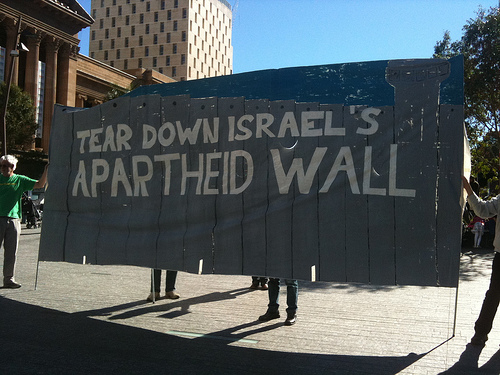The chorus of voices is now overwhelming. With the report published by Amnesty International on Monday asserting that Israel is guilty of the crime of apartheid against Palestinians, there should be no more question that serious international intervention is required.
Amnesty is just one of the organizations, experts and scholars who have made similar proclamations over the years. Just last April, Human Rights Watch published a similar comprehensive report concluding that Israel was guilty of the crime against humanity of apartheid.
Amnesty and Human Rights Watch join a long list of Israeli human rights organizations who have also made the same claim: B’Tselem, Yesh Din, Gisha, Physicians for Human Rights Israel, Breaking the Silence, Peace Now Israel, Adalah, and Hamoked, have all concluded that Israel is committing the crime of apartheid against Palestinians.
Of course, for observers on the ground in Palestine-Israel, you don’t need to be an expert in public international law to come to the same conclusion. The late Desmond Tutu, who fought apartheid in South Africa for decades, easily concluded, “I know first-hand that Israel has created an apartheid reality within its borders and through its occupation. The parallels to my own beloved South Africa are painfully stark indeed.”
Like the other human rights organizations before it, Amnesty makes many observations about Israel that make for difficult reading. It describes how “massive seizures of Palestinian land and property, unlawful killings, forcible transfer, drastic movement restrictions, and the denial of nationality and citizenship to Palestinians” taken together constitute an oppressive apartheid regime.
An apartheid system does not spring into being from one moment to the next; Palestinians know this better than anyone else. In a decades-long process, Palestinians witnessed first-hand the erection of Israel’s brutal apartheid regime around them. From both a legal and practical perspective, they have argued for years that Israel’s dominance over their lives constituted an apartheid system. Sadly, they were ignored.
It remains to be seen whether this latest indictment of Israel by Amnesty will do anything to sway Canadian leaders to action. Unfortunately, the prognosis isn’t good. In response to Human Rights Watch’s assessment last year, Canada’s foreign affairs minister “categorically” rejected the apartheid label. And even before Justin Trudeau was elected prime minister, he tweeted that discussion of Israeli apartheid “has no place on Canadian campuses.” With Amnesty’s report, such dismissive attitudes clearly need to change.
Amnesty’s Secretary General, Agnès Callamard might have been speaking to the Trudeau government when she said, “The international response to apartheid must no longer be limited to bland condemnations and equivocating.” In fact, Amnesty made several recommendations that Canada could and should promptly adopt.
Amnesty’s report urges all countries to end arms sales to Israel. With $57 million in arms sales to Israel over the last five years, Canada can quickly and easily implement this recommendation.
Amnesty’s report also calls on states to ban the import of products from illegal Israeli settlements. De facto Jewish-only colonies on Palestinian land, Israel’s settlements pepper the West Bank and symbolize some of the greatest excesses of Israeli apartheid. Yet Canada’s free trade agreement with Israel makes no distinction between trade from Israel-proper and the settlements, despite appeals from eminent Canadian experts when the trade agreement was updated in 2019.
The Amnesty report also urges countries to end diplomatic protection for Israel for its violations of international law. Successive Canadian governments have provided diplomatic cover for Israel and its crimes in many different ways, and this policy was verbalized in 2018 by foreign affairs minister Chrystia Freeland, when she stated that if Canada won a seat on the UN Security Council, it would act as an “asset for Israel.”
Many of Amnesty’s latest recommendations have long been advocated by opposition parties and Canadian human rights organizations. If the Trudeau government ignores Amnesty’s injunction, they again signal that their support for a rules-based international order is mere lip-service, and that Canadian civil society will once again have to spearhead opposition to apartheid, just as it did for South Africa 50 years ago.
Applying the apartheid label to Israel is not meant as an insult or a smear. Amnesty and the other human rights organizations and experts who have applied the term to Israel have done so carefully and objectively, justifying their conclusions through a rigorous and extended review of Israeli laws, policies and practices. Domestic pro-Israel lobby groups are powerful and influential, and as a result, successive Canadian governments have tried to give Israel the benefit of the doubt for many years. But the time has come for Canada to demand much more from a country that Prime Minister Trudeau has repeated described as a friend and ally.
Palestinians have suffered under cruel, capricious and degrading Israeli policies for decades: their homes demolished, their communities walled in, their children arrested, their fathers languishing as political prisoners in Israeli jails. Israeli human rights organization Gisha challenges Israelis to “confront a painful reality that Palestinians have lived and described for decades. Those who think it’s easier to look away or blame the messenger are mistaken.”
Canadian leaders too must finally confront the reality, not look away, and not blame the messenger.



